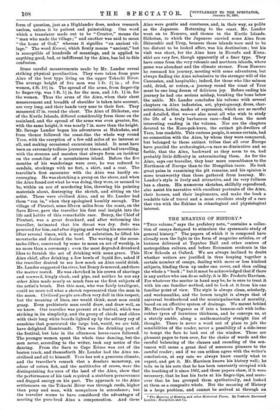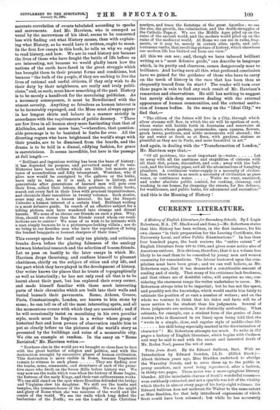THE MEANING OF HISTORY.* "THIS volume," says the prefatory note,
"contains a collec- tion of essays designed to stimulate the systematic study of general history." The papers of which it is composed have already seen the light in the form of magazine articles, or of lectures delivered at Toynbee Hall and other centres of metropolitan culture, and before Extension students in the New Schools at Oxford. We are always inclined to doubt whether writers are justified in thus heaping together a certain number of essays, dealing with more or less kindred subjects, binding them up under one cover, and then calling the whole a " book ; " but it must be acknowledged that if there is any author who can do so safely, it is Mr. Frederic Harrison. For whatever the matter in hand may be, he is sure to treat it with his one familiar method, and to look at it from his one familiar point of view. The style is always clean, scholarly, and workmanlike, and the lesson taught is always that of universal brotherhood and the municipalisation of morality, based on an effective system of drainage. We mount behind Mr. Harrison's Pegasus as if into a hansom-cab with india- rubber tyres of luxurious thickness, and he conveys us, at a stately amble, along a mathematically straight line of thought. There is never a word out of place to jolt the sensibilities of the reader, never a possibility of a side-issue to tempt the fare to look out of the window. These are pleasant pages to turn over, for the choice of words and the careful balancing of the clauses and rounding of the sen- tences will cause a great deal of sensuous pleasure to the careful reader ; and if we can seldom agree with the writer's conclusions, at any rate we always know exactly what to expect, and get it. Mr. Harrison knows his history well; he tells us in his note that he has been constantly occupied with the teaching of it since 1862, and these papers show, if it were necessary, that he has his facts at his finger-tips, and more- over that he has grouped them synthetically, and looked at them as a composite whole. But the meaning of History is a large problem, and cannot be arrived at through an
• The Meaning of History, and other Historical Pieces. By Frederic Harrison] London: Macmillan and Co.
accurate correlation of events tabulated according to epochs and movements. And Mr. Harrison, who is cramped as usual by the narrowness of his ideal, seems to be concerned less with finding out what History means, than with explain- ing what History, as he would have it written, ought to mean. In the first few essays in this book, he tells us why we ought to read history, and how. We are to read history not because the lives of those who have fought the battle of life before us are interesting, not because we would gladly learn how the nations of the earth have fared in the great struggle which has brought them to their present forms and conditions, but because " the bulk of the people, if they are seeking to live the lives of rational and useful citizens, if they only wish to do their duty by their neighbours, are really and truly politi- cians," and, as such, must know something of the past. History is to be merely a handbook for the moralising politician. As a necessary consequence, it must be Bowdlerised with the utmost severity. Anything so frivolous as human interest is to be inexorably expunged, and the Muse must always appear in her longest skirts and behave in a manner strictly in accordance with the requirements of public decency. " There are few lives in all human story more fascinating than that of Alcibiades, and none more base,"—wherefore, that question- able personage is to be banished to limbo for ever. All the diverting rogues who have brightened the world's stage with their pranks, are to be dismissed from the boards, and the drama is to be told in a dismal, edifying fashion, for grace is meretricious. It seems incredible, but here is the passage at full length :-
" Brilliant and ingenious writing has been the bane of history : it has degraded its purpose, and perverted many of its uses. Histories have been written which are little but minute pic- tures of scoundrelism and folly triumphant. Wretches, who if alive now would be consigned to the gallows or the hulks, have only to take, as it is said, a place in history, and generations after generations of learned men will pore over their lives, collect their letters, their portraits, or their books, search out every fact in their lives with prurient inquisitiveness, and chronicle their rascalities in twenty volumes. Such stories, some may say, have a human interest. So has the Newgate Calendar a human interest of a certain kind. Brilliant writing is a most delusive guide. In search of an effective subject for a telling picture, men have wandered into strange and dismal haunts. We none of us choose our friends on such a plan. Why, then, should we choose thus the friends round whom our recol- lections are to centre ? We none of us wish to be intimate with a man simply because he is a picturesque-looking villain ; nor do we bring to our firesides men who have the reputation of being the loudest braggarts or keenest sharpers of their time."
This excerpt speaks for itself only too plainly, and criticism breaks down before the glaring falseness of the analogy between historical research and the selection of bosom-friends. Let us pass on hastily to the later essays in which Mr. Harrison drops theorising, and confines himself to pleasant chattiness, chiefly on the subject of cities and city life, and the part which they have played in the development of history. Our writer knows the places that he treats of topographically as well as historically; he has not only read all that is to be learnt about their past, but has explored their every corner, and made himself familiar with those most interesting parts of their chronicles which are built into their walls and buried beneath their pavements. Rome, Athens, Greece, Paris, Constantinople, London, are known to him stone by stone; he can tell us of all the most interesting spots, and all the momentous events with which they are associated ; and if he will occasionally insist on moralising in his own peculiar style, much must be forgiven in a writer whose grasp of historical fact and keen powers of observation enable him to put so clearly before us the pictures of the world's story as presented by the buildings and rains of a memorable city.
We cite an example at random. In the essay on " Rome Revisited," Mr. Harrison writes :-
"Nowhere else in the world are we brought so close face to face with the great battles of religion and politics, and with the destruction wrought by successive phases of human civilisation. This destruction is more visible in Rome, because fragments
remain to witness to each phase They are finding now the tombs, arms, ornaments, and structures of each of the primi- tive races who dwelt on the Seven Hills before history was We may now see the walls which rose when the history of Rome began, the fortress of the early Kings, and their vast subterranean works We can still stand on the spot where Horatius defended the bridge and Virginius slew his daughter. We still see the tombs and temples, the treasure-house of the Republic. We see the might and glory of Rome when she was mistress of the world and the centre of the world. We see the walls which long defied the barbarians of the North; we see the tombs of the Christian martyrs, and trace the footsteps of the great Apostles ; we see the rise, the growth, the culmination, and the death-struggles of the Catholic Papacy. We see the Middle Ages piled up on the ruins of the ancient world, and the modern world piled up on the ruins of the mediaeval world. At Rome we can see in ruins, frag- ments, or it may be, merely in certain sites, spots, and sub- terranean vaults, that revolving picture of history, which elsewhere our modern life has blotted out from our view."
All this we can see; and, though we have tabooed brilliant writing as a "most delusive guide," can describe in language which, in its parity and clearness, comes dangerously near to brilliance. And having seen all this, what profound conclusion have we gained for the guidance of those who have to carry on the torch of history in the race that has been thus so eloquently traced from its start ? The reader will turn over these pages in vain to find any such result of Mr. Harrison's researches and observations. He still has nothing to suggest but merely skin-deep measures dealing with the external appearance of human communities, and the external sanita- tion of human bodies. In the essay on the "Ideal City," we find that,-
" The citizen of the future will live in a City, through which silver streams will flow, in which the air will be spotless of soot, where water will bubble forth in fountains and reservoirs at every corner, where gardens, promenades, open squares, flowers, green lawns, porticoes, and noble monuments will abound ; the air and water as fresh as at Bern, with gardens, statues as plentiful as they are in Paris, and more beautiful in art."
And again, in dealing with the "Transformation of London," Mr. Harrison says that,— " Of all problems, the most important is—water Let
us away with all the nastiness and stupidities of cisterns. with all their dirt, poison, discomfort, and cost ; away with the ball- cock, and the bursting pipes, and all the abominations of bungling plumbers. A continuous water-supply is a necessity of civilisa- tion. But free water is as much a necessity of civilisation as pure water, or continuous water Water we want, unstinted, and under absolute public control, for cooking, cleaning, and washing in our homes, for cleansing the streets, for fire defence. for washhonses, and public baths, for adornment and recreation."
And this is the Meaning of History !



















































 Previous page
Previous page